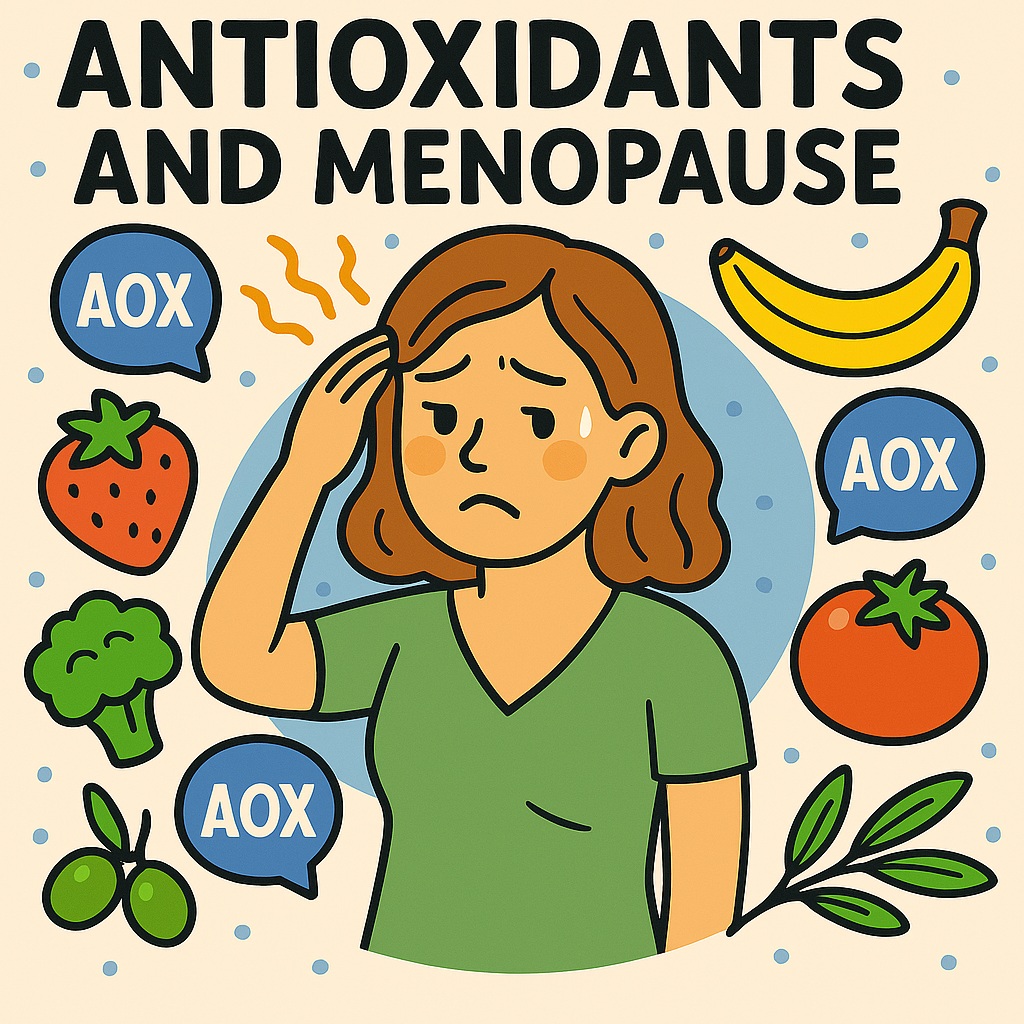
Menopause is a natural stage every woman experiences, typically occurring between the ages of 45 and 55. During this period, estrogen levels decline gradually, triggering a series of physical and psychological changes such as hot flashes, mood swings, osteoporosis, and increased cardiovascular risks.
 Why Focus on Antioxidants During Menopause?
Why Focus on Antioxidants During Menopause?
During menopause, the production of free radicals in the body increases. Free radicals are unstable molecules that attack cells, causing oxidative stress. This oxidative stress accelerates cell aging, damages DNA and tissues, and promotes inflammatory responses. It is a key factor in osteoporosis, arteriosclerosis, and cognitive decline (Kim et al., 2023).
Recent studies show that oxidative stress markers like malondialdehyde (MDA) are approximately 20% higher in menopausal women compared to women of reproductive age (Zhang et al., 2024), indicating a heightened need for antioxidant protection.
Antioxidants can neutralize free radicals, reduce oxidative damage, and maintain cellular health.
 Key Antioxidants
Key Antioxidants
-
Vitamin C: Helps eliminate free radicals, promotes collagen synthesis, and supports skin elasticity and immune function (Carr & Maggini, 2017).
-
Vitamin E: A fat-soluble antioxidant that protects cell membranes from oxidative damage (Traber & Atkinson, 2007).
-
Polyphenols: Found in tea, red wine, blueberries, and pomegranates, with potent antioxidant effects (Scalbert et al., 2005).
-
Selenium: A trace mineral essential for antioxidant enzymes like glutathione peroxidase (Rayman, 2012).
-
Coenzyme Q10: Supports cellular energy metabolism and exhibits antioxidant properties (Bhagavan & Chopra, 2007).
 Latest Research Advances
Latest Research Advances
-
Antioxidants Reduce Menopausal Inflammation and Symptoms
A 12-month randomized controlled trial published in Menopause (2025) involving 500 menopausal women found that daily intake of green tea extract rich in polyphenols (about 500 mg EGCG) significantly reduced blood levels of C-reactive protein (CRP) by 18% and alleviated the frequency and severity of hot flashes (Wang et al., 2025).
-
Coenzyme Q10 Improves Cardiovascular and Cognitive Functions
A 2024 study in the Journal of Clinical Nutrition showed that taking 100 mg of Coenzyme Q10 daily for over six months significantly improved vascular endothelial function, lowered blood pressure by 3-5 mmHg, and enhanced short-term memory (Lopez et al., 2024).
-
Combined Antioxidant Supplementation Is More Effective
A 2025 review in Antioxidants concluded that combined supplementation with vitamins C and E plus selenium produces a synergistic antioxidant effect, reducing oxidative damage markers (such as 8-isoprostanes) by more than 25% and positively impacting bone density maintenance (Chen et al., 2025).
-
Dietary Patterns Influence Antioxidant Status
Research published in Nutrients (2024) demonstrated that menopausal women following a Mediterranean diet exhibited 30% higher total antioxidant capacity in their blood and experienced lower risks of osteoporosis and cardiovascular disease (Martinez-Gonzalez et al., 2024).
 How to Supplement Antioxidants Scientifically?
How to Supplement Antioxidants Scientifically?
-
Balanced Diet: Consume plenty of fresh fruits and vegetables (such as spinach, blueberries, and carrots), nuts, and whole grains.
-
Moderate Exercise: Exercise enhances the body’s natural antioxidant systems (Radak et al., 2013).
-
Avoid Smoking, Alcohol, and Excessive Stress: These factors increase free radical production.
-
Supplement Wisely: Use antioxidant supplements under medical guidance when needed.
 References (Recent Studies)
References (Recent Studies)
-
Chen, Y. et al. (2025). Synergistic effects of vitamin C, vitamin E and selenium supplementation on oxidative stress markers and bone health in menopausal women. Antioxidants, 14(2), 120.
-
Lopez, M. et al. (2024). Effects of Coenzyme Q10 supplementation on vascular function and cognitive performance in menopausal women: A randomized controlled trial. Journal of Clinical Nutrition, 39(7), 2123-2130.
-
Martinez-Gonzalez, M. A. et al. (2024). Mediterranean diet and antioxidant status in menopausal women: implications for bone and cardiovascular health. Nutrients, 16(1), 35.
-
Wang, J. et al. (2025). Green tea polyphenols reduce inflammation and menopausal symptoms in women: A 12-month randomized controlled trial. Menopause, 32(3), 245-255.
-
Zhang, L. et al. (2024). Elevated oxidative stress markers in menopausal women: a comparative study. Oxidative Medicine and Cellular Longevity, 2024, 9876543.
Explore Supplements
Discover detailed information about dietary supplements and their ingredients.
Browse SupplementsMore Articles
Read more articles about nutrition, health, and dietary supplements.
Read More Articles